Artists' Books
Artists' Books

Anabases
This book documents an installation by Eric Baudelaire revisiting the political and personal saga of the Japanese Red Army as an anabasys—an allegory of a journey that is both a wandering into the unknown and a return back home.
“This book is not for reading but for wandering. Its lines do not roll out continuously but superimpose each other to infinity, creating not a compendium of knowledge but a web of prescience. It does not follow a logical framework but unfurls a grid with multiple entries. It does not assert a set subject or conclusive postulate. At most it invites us to probe the recesses of a mind in motion, and steeps us in the driving material that brings it to life. It reflects the works it exhibits, the documents it discloses and the commentary it generates: it aspires to ubiquity. Anabasis, the very real linking thread that stitches it together, serves not just as an archaeological enigma, but also as an allegorical force. The main author of this ocean crossing, Eric Baudelaire, is both a collector of vestiges and a sketcher of wandering lines who has surrounded himself with other meticulous voices (Pierre Zaoui, Homay King, Jean-Pierre Rehm), fellow-travellers in this library secret. Readers will be able to enjoy the gradual unfolding of the story of war and politics whose underlying intellectual and poetic adventure this book enables us to recall—that of its repetitions, ramifications and hybridisations: the story of Anabasis after Anabasis (or from Xenophon's Anabasis to that of Paul Celan by way of Alain Badiou's), from an ancient narrative to its modern reappropriation.” — Morad Montazami
Edited by Eric Baudelaire and Anna Colin.
Texts by Morad Montazami, Pierre Zaoui, Homay King, Jean-Pierre Rehm.

Where is Cinema
This book is compiled of portraits of film initiatives from around the world, interwoven with conversations with adventurers who have rebooted movie theatres or built them up from the ground in the hope that it can be an inspiring compendium for future cinema builders, filmmakers, film curators and film lovers.
Anouk De Clercq in conversation with Verena von Stackelberg, Ana López Ortego and Daniel Bejarano, Ilona Jurkonytė and Ugnė Marija Andrijauskaitė, Adam Pugh, Thomas Liu and Silja Espolin Johnson, Erika Balsom, Beatrice Gibson, María Palacios Cruz and Ben Rivers, Heather Lane and Mia Ferm.
The author is an artist and filmmaker based in Brussels and Berlin. In her work, she explores the potential of audiovisual language to create possible worlds. She is affiliated as an artistic researcher to the School of Arts University College Ghent, and a founding member of Cinema Nova, Monokino and Auguste Orts.

A Long List Of Safe Words – (A.L.L.O.S.W)
A compilation of texts, poems and stories whose title is borrowed from the safe words used in BDSM practices.
Published on the occasion of the exhibition “Puberté 2”, Ravisius Textor, Nevers, from October 5 to November 16, 2019. Kevin Desbouis is a French artist and author.

The Lost Diagrams of Walter Benjamin
In A Berlin Chronicle Walter Benjamin describes his autobiography as a space to be walked (indeed, it is a labyrinth, with entrances he calls primal acquaintances). The contributors to The Lost Diagrams respond to the invitation to accompany Benjamin in reproducing the web of connections of his diagram, which, once lost (he was inconsolable), was never fully redrawn. They translate his words into maps, trees, lists, and constellations. Their diagrams, after Benjamin, are fragments, scribbles, indexes, bed covers, and body parts. Subjectivities sharpen and blur, merge and redefine, scatter and recollect. Benjamin writes: ‘Whatever cross connections are finally established between these systems also depends on the inter-twinements of our path through life’.
Contributors: Helen Clarke, Sam Dolbear, Sharon Kivland, Christian A. Wollin

Moi
The straplines of a number of advertisements drawn from magazines of the 1950s are turned into drawings, as though a particularly vain and narcissistic woman speaks (as of course she does), She is ‘en pleine forme’ of her beauty. (2016).

Library
LIBRARY contains four essays and two interviews, with the pre-dominant concern of sexual questions: the subjects in art, film, and literature—the issues tied to Rivette’s La Belle Noiseuse, Madonna’s sexual assault in Dangerous Game, Clunie Reid’s use of language, Richard Prince’s obsession with books, and Paul Meyersberg’s articulation about sex.
‘Like Carol Reed’s crippled trapeze artist now devoted to sensuality, Paul Buck is more than a suitable case for treatment. A personable deviant, Buck’s culpable, desiring proximity steeps these writings, inasmuch as they are apostrophised by his appearance in cameo, inside and outside the text. Buck stalks his work, addressing us in collusive asides. Rather than the disinterest of resistable objectivity, Buck’s criticism is moved by a profound personal investment in his subjects; he does not elide his complicity, nor does he quiet moral considerations. Discussing Richard Prince’s library or Madonna’s instrumentality, Buck makes the possessive, accountable case throughout. His underlying subject is the snarl of art and life, and the perils that abound in their confusion in the personal and their forced dichotomy in culture at large. Art, for Buck, cannot be an apology for the failures of experience, but instead is a compulsive and risky exposure, like a heretical grace, modelling life for our benefit.’ - Ed Atkins
‘Translator, poet, collagist, archivist, novelist, and all-around intellectual impresario, Paul Buck has a formidable knowledge of culture that he shines like a laser in LIBRARY on Richard Prince, Madonna, Abel Ferrera, and the erotics of painting and representation. He approaches the critical essay like a crime scene investigation. LIBRARY is a fantastic read’. - Chris Kraus

New Skin / Levitations
This book assembles the scripts of two solo performances levitations (2017) and New Skin (2018). Hannah De Meyer's work connects with the eco-feminist tradition and investigates the connections between femininity, ecology and decolonization. She merges text and movement into a quirky, hybrid theater language. Levitations is an enchanting trip along the peaks and valleys of De Meyers imagination. The recent new skin is an overwhelming feminist and ecological statement.

Typefaces don't care, typefaces do care
Jungmyung Lee, Charlie Clemoens
Real-Time Realist is a serial publication of J-LTF PRESS. This issue of Real-Time Realist explores Ecstasy, Joy, Serenity, and Love, The Yellow Wheel, with contributions from invited artists distilling the aforementioned emotions.

The New Woman's Survival Catalogue
Kirsten Grimstad, Susan Rennie
Originally published in 1973, The New Woman's Survival Catalog is a seminal survey of the second-wave feminist effort across the US. Edited by Kirsten Grimstad and Susan Rennie in just five months, The New Woman's Survival Catalog makes a nod to Stewart Brand's influential Whole Earth Catalog, mapping a vast network of feminist alternative cultural activity in the 1970s.
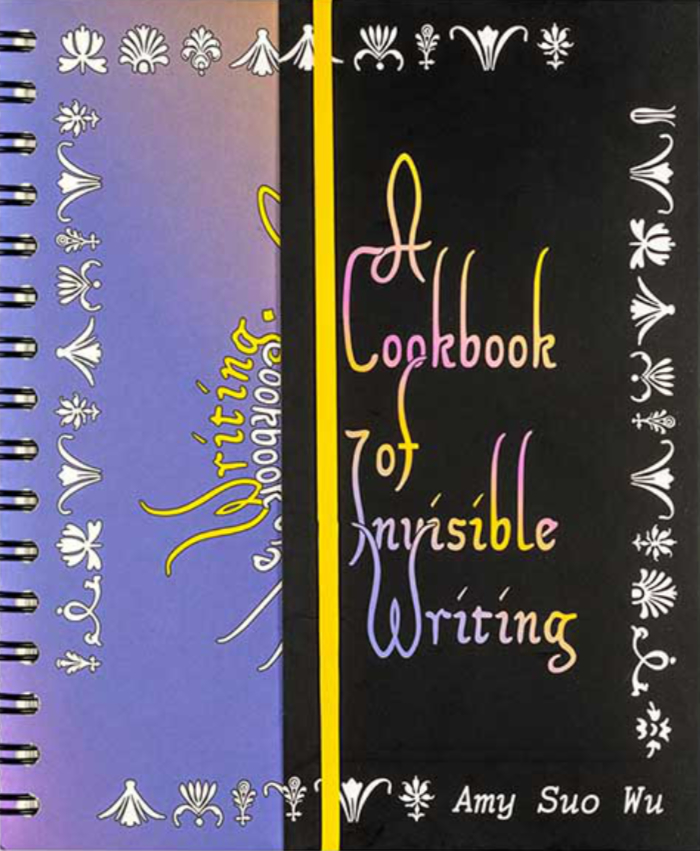
Cookbook of Invisible Writing
A Cookbook of Invisible Writing, by Dutch artist, designer and teacher Amy Wu, is an introduction to analog steganography—a type of secret writing that is hidden in plain sight. This book serves as a starter pack to run workshops with groups who are interested in alternative forms of communication. It contains invisible ink recipes and other invisible communication techniques that may be used to subvert surveillance and bypass censorship, but also inspire your community to develop poetic and playful forms of communication to nurture social bonds. In the tradition of esoteric manuals published on secret writing, this cookbook also channels the spirit of everyday access and the easy distribution and sharing of practical knowledge.
Following Giambattista della Porta's 1558 popular science book Natural Magic—one of the first major publications that detailed simple but diverse recipes of invisible inks for public consumption—this cookbook aims to bring this obscure field to a wider audience. The publication includes a critical essay about the history of surveillance through a feminist and postcolonial lens. The last chapter presents Wu's own body of work that aims to revive analog techniques as a counter to today's digitally surveilled mediascape.

Théorie De L'Indiscernable
João Maria Gusmão, Pedro Paiva
Livret de 56 pages; format 13x21; illustré; couverture souple; cousu. Traduction originale du portugais ("Teoria do indiscernível" texte figurant dans le vol. "Abissologia - Teoria do Indiscernível", Lisboa - 2012). Édition bilingue portugais-français.
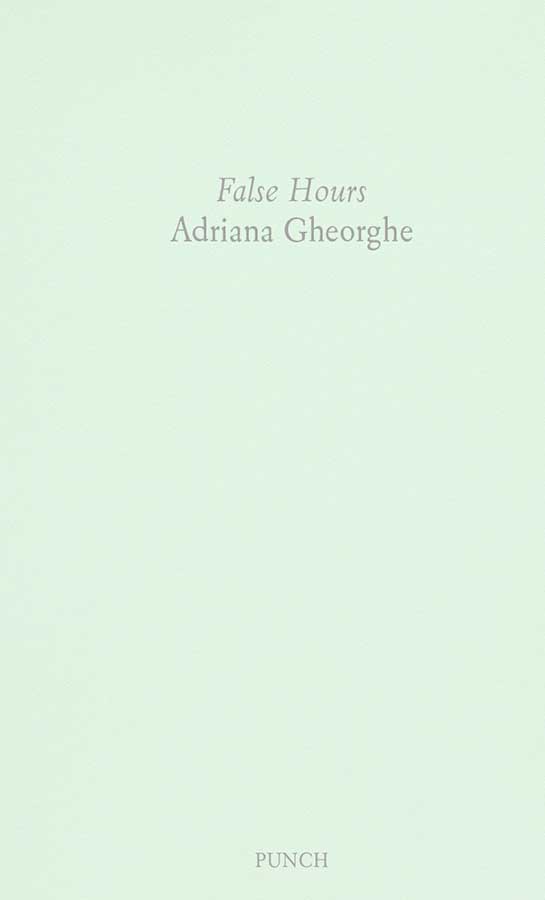
False Hours
Adriana Gheorghe works with performance and writing and a gravely irreverent sense of indeterminacy, while in relation to contexts (conceptual, physical, political, human), and for the reformulation of the same ongoing artistic and living practice – the performative imagining of the humans in relation to language and representation, hijacking subjectivity and identity with the crack of endless potentiality.

Square of Will in Square of Love
A collection of texts, notes and drawings from Alina Popa (1982-2019), edited as a tribute publication by her longtime accomplice, the artist Florin Flueras. A political and theoretical work that questioned both the intimate and social mechanisms of the contemporary.
Square of Will in Square of Love gathers a selection of texts, notes and drawings by Alina Popa, edited by Florin Flueras. Most texts are more poetic and more personal than Alina’s previously published writing, “...a mixture of styles, subjects and mediums—theory, poetry, drawings, diary notes, it's unclassifiable, as she liked it.” (Florin Flueras).
Alina Popa (1982-2019) was a Romanian artist who moved between choreography, theory, and contemporary art.

Spread Wide
Rebecca Stevens, John Cussans and 2 more
Various artists and authors use two writers' correspondence as a primary source to develop an artistic and literary falsification. In this collaborative volume, the writer and artist Paul Buck works with the late 29 Kathy Acker. Using as source the raw materials of their correspondence from the early Eighties, a period when Acker was writing Great Expectations and trying to leave America for London, Buck confronts issues of appropriation, sampling, and plagiarism, relevant then and now.
Further encounters are triggered by writer Rebecca Stephens, artist John Cussans... and playwright Richard Foreman, artist Susan Hiller, musician David Coulter. Kathy Acker (1947-1997) was at the forefront of transgressive writing from the Seventies until her death. Her provocative intertextual narratives—halfway between autobiography and pornography—were developed in lectures, performances and films (Variety, Bette Gordon).
Her published work includes Blood and Guts in High School (1984), Don Quixote (1986), and Empire of the Senseless (1988). Rebecca Stephens escaped the chains of theology teaching to write on Saints and Courtesans, subjects on which books are in the pipeline.
John Cussans is a writer, artist and researcher who has exhibited regularly in London, Berlin, Slovenia, Vienna, Vancouver. In 2001 he founded The Bughouse, an art-event generator inspired by the work of Philip K. Dick. Paul Buck (born 1942, United Kingdom) is a British poet, performer and author of more than fifty crime novels. He has been challenging notions of writing, narrative, and the limits of the feasible since the late Sixties in books like The Honeymoon Killers, Violations and Lust, Walking into Myself... Chief editor of Curtains magazine, he introduced many French authors to the English audience.

Aftershow
A monograph / artists' book that engages with the recent film installations of Pauline Boudry / Renate Lorenz. Installation shots, research material, scripts, and film stills give an insight into the artists' investigation of performance in film and their dense net of references to experimental film, the history of photography, sound, and underground (drag) performances.
The book's title alludes to an interest in opaque events that are belated, left backstage or off-screen. A number of (fictitious) letters to friends and collaborators such as Sharon Hayes, Yvonne Rainer, Ginger Brooks-Takahashi, and Jack Smith place the work of Boudry & Lorenz in a context of debates around temporalities, activism, the archival, decolonizing practices, and queer histories. Published following the exhibition “Patriarchal Poetry” at the Badischer Kunstverein, September 27– November 24, 2013.

I Want
I Want reviews the eponymous duo's double-projection film installation examining issues of gender, sexuality and performativity—and inspired by the words of punk poetess Kathy Acker and convicted whistle-blower Chelsea Manning. This publication documents the major film installation I Want (2015) by collaborative artists Pauline Boudry and Renate Lorenz, which was presented at their 2015 solo exhibitions at Kunsthalle Zürich and Nottingham Contemporary.
The double-projection film installation is based on a script that borrows texts from American punk-poet Kathy Acker (1947-1997), as well as chats and materials by convicted whistle-blower Chelsea Manning that speak of her reasons for revealing nearly one million secret military and diplomatic documents through WikiLeaks, at the same time exposing her transgender identity to her superiors.
Through poetic gestures of appropriation and recombination, Boudry and Lorenz examine issues around gender, sexuality, the performance of identity, and the nature of collaboration. Alongside generous color documentation, written contributions by Gregg Bordowitz, Laura Guy, Dean Spade, and Craig Willse unpack and reflect upon both the historical context and contemporary significance of this multivalent work.
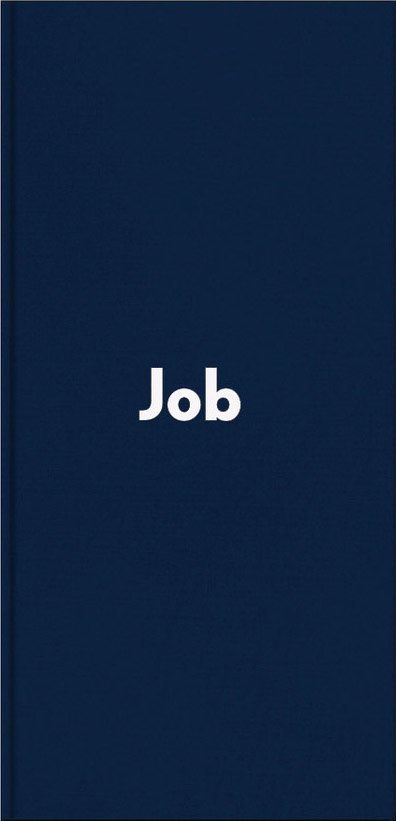
Job Interviews
“The ritual of the job interview can be considered as a courtship that’s conditioned by protocols that ask for a quite particular display: with social relations as material, a dance of conformity, the attempted imagining and echoing of expectations.”
This anthology of commissioned writing includes contributions by Nadim Abbas, Howie Chen, Heman Chong, Matthew Dickman, Jason Dodge, Angie Keefer, Holly Pester, Natasha Soobramanien, Marina Vishmidt, and Jonas Žakaitis.
Edited and illustrated by Chris Evans, and co-published with Para Site, Hong Kong.
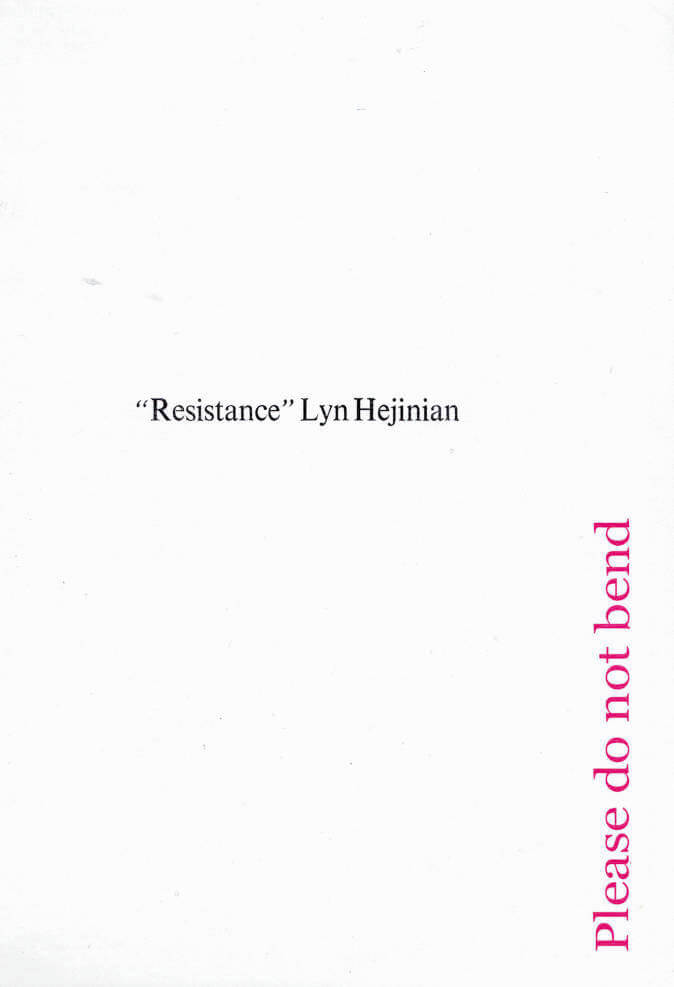
“Resistance”
Lyn Hejinian’s unpublished prose poem which (in her better-known essay The Rejection of Closure) the author reads closely as model for various, open, equitable relations between language and things (such as human bodies, as emphasised in a commentary exploring the destituent potential of Hejinian’s faltering poetic corpus, in “A Draft of Resistance” by Andrea di Serego Alighieri), in an envelope.
1. Lyn Hejinian’s unpublished prose poem which (in her better-known essay The Rejection of Closure) the author reads closely as model for various, open, equitable relations between language and things (such as human bodies, as emphasised in
2. A commentary exploring the destituent potential of Hejinian’s faltering poetic corpus, in “A Draft of Resistance” by Andrea di Serego Alighieri), in
3. An envelope.
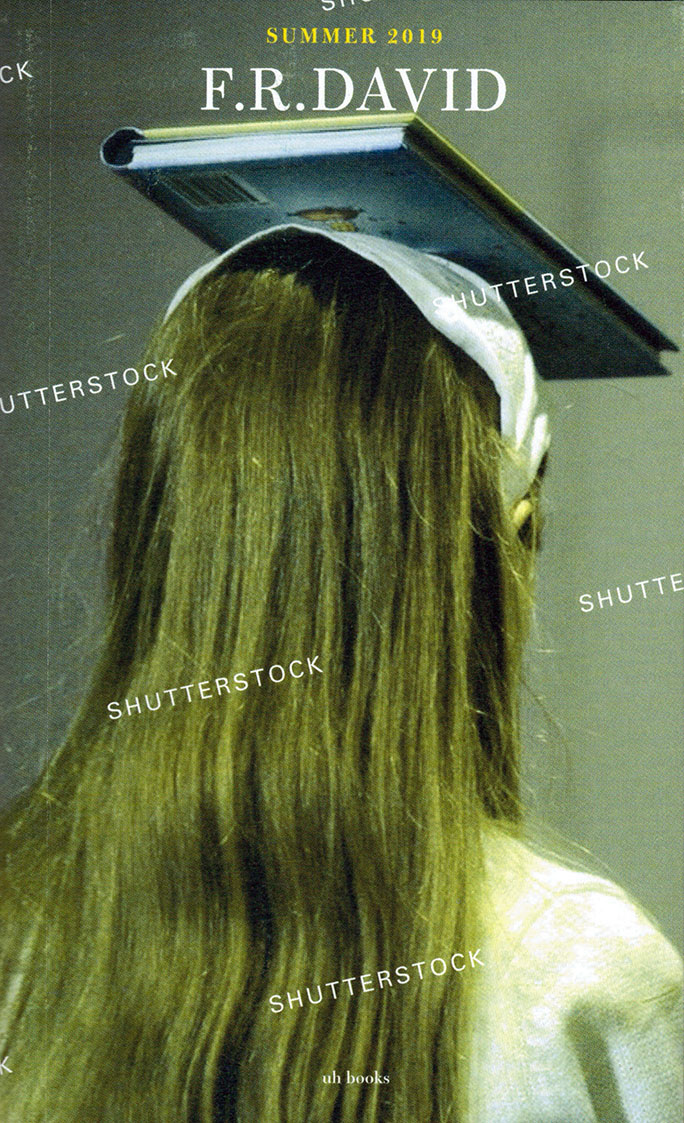
F.R. David - Recto Verso
F.R.DAVID is a typographical journal, dealing with the organisation of reading and writing in contemporary art practises. The 18th issue, “Recto Verso” is edited by Will Holder, and had its beginnings in prosody, the measure of language, geometry, and a notion of imagist transcription, even. A two-dimensional exercise, it turns out, on paper. Words were tuned out, in favour of the volume of values our bodies exchanged: “the historical and bodily movement of language amongst subjects.” Attentions turned—taking (the measure of) classes in body language: the non-verbal: the insinuated: the reverse-side of image: the backside, and, oddly: Oh no: we don’t speak about that—to the next page…
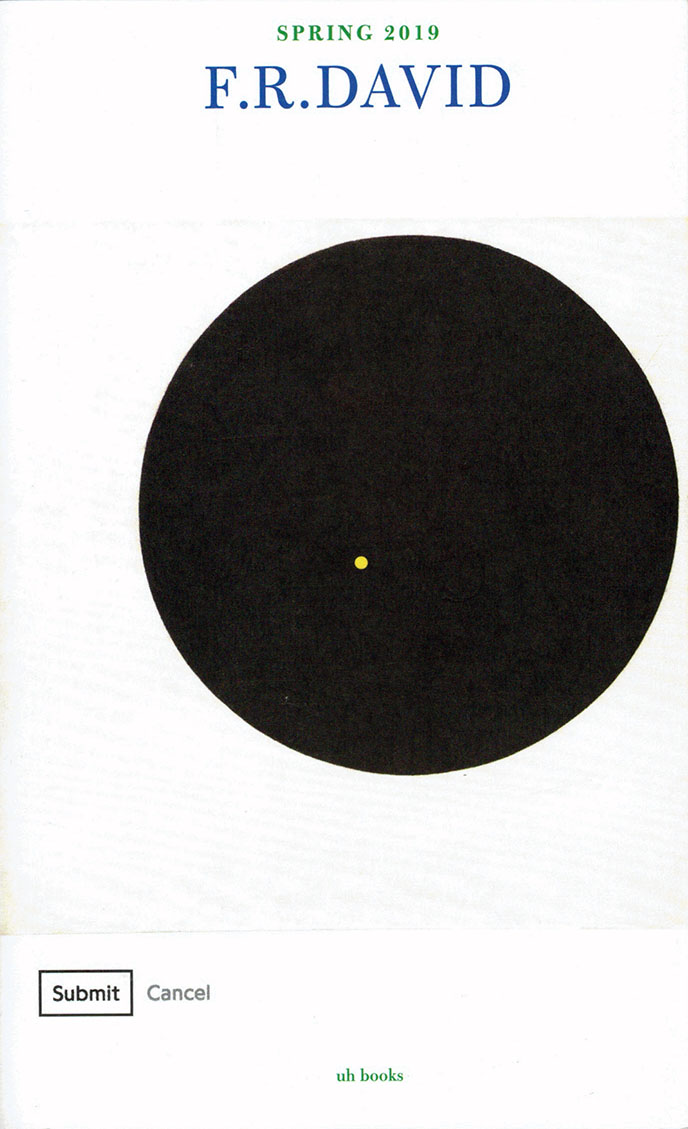
F.R. David - Black Sun
“Black Sun” the 17th issue, edited by Will Holder in conversation with Krist Gruijthuijsen, to accompany the exhibitions David Wojnarowicz Photography & Film 1978–1992, Reza Abdoh, and TIES, TALES AND TRACES. Dedicated to Frank Wagner, Independent Curator (1958–2016), at KW Institute for Contemporary Art, Berlin. The issue departs from Wojnarowicz’s grief at the loss of loved ones during the 1980s AIDS crisis, and anger at the US government for their willful neglect of this loss.
The issue assembles a chorus of various gendered and sexual positions, all seeking support, love and intimacy in linguistic, architectural and bodily structures, all the while under threat of collapse. These voices are threaded together with excerpts from Julia Kristeva’s white, feminist, psychoanalytical, semiotic Black Sun. Depression and Melancholia (1992).
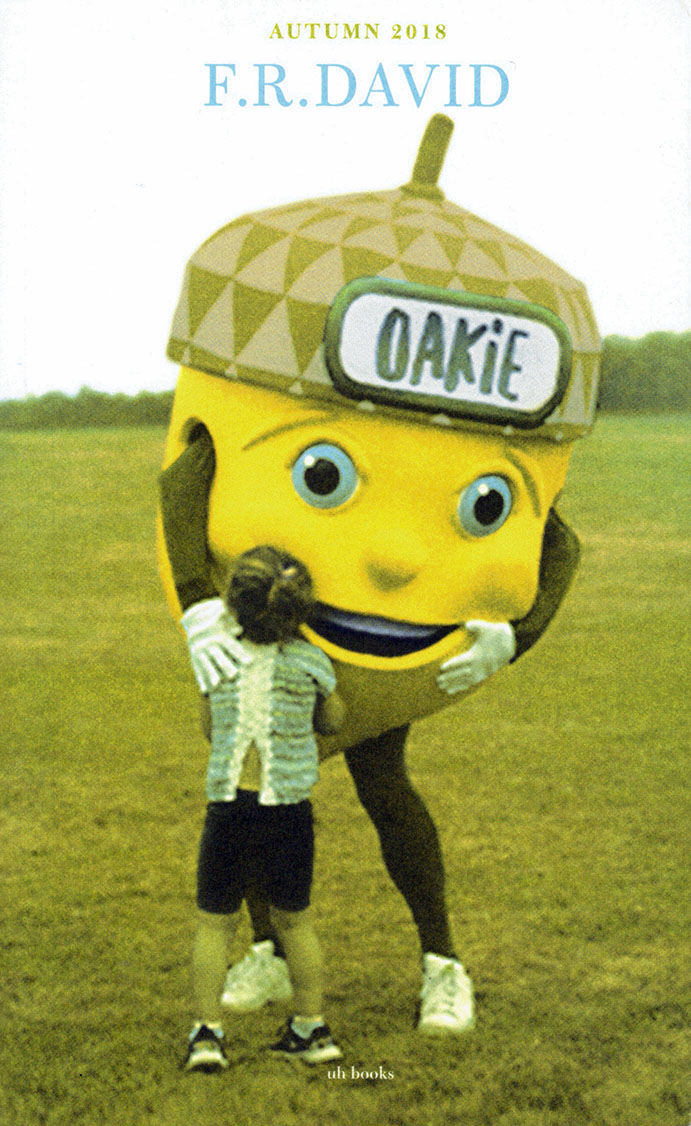
F.R. David - what I mean is—
F.R.DAVID is a typographical journal, dealing with the organisation of reading and writing in contemporary art practises. “what I mean is—” the 16th issue, edited by Will Holder.
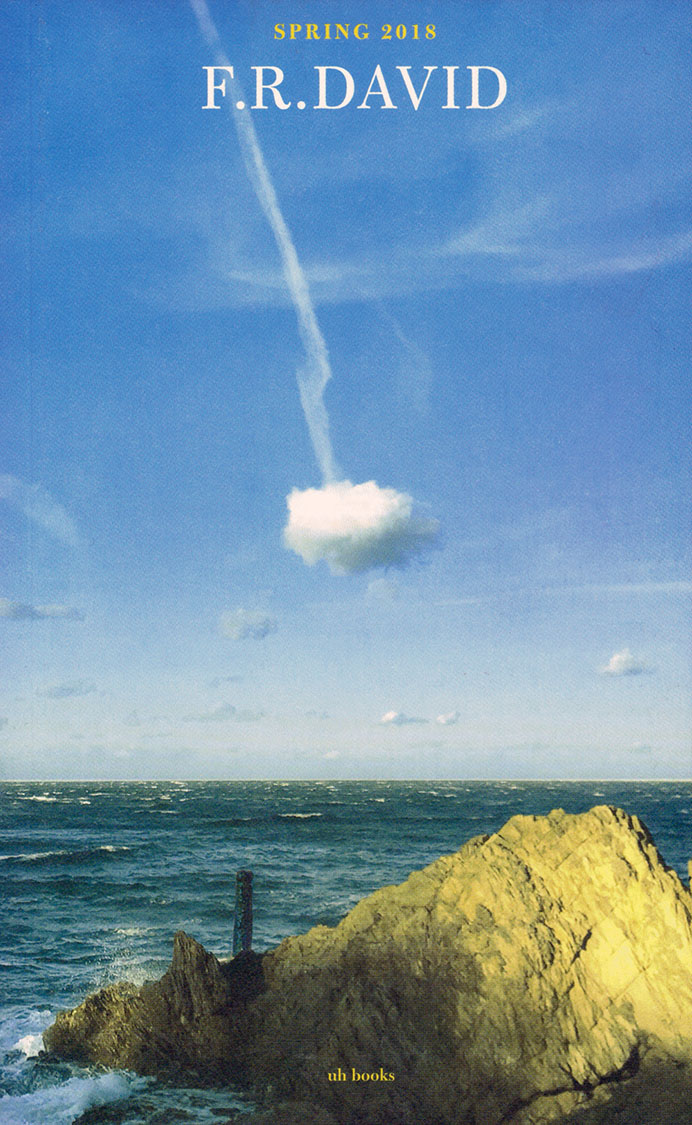
F.R. David - Flurry
F.R.DAVID is a typographical journal, dealing with the organisation of reading and writing in contemporary art practises. “Flurry” is the 15th issue (a best-of, of sorts) edited by Will Holder. “I realized very slowly over a period of time that the activity of framing a performance and the intentions that accumulate around that activity produce a certain anxious kind of mode, and I became bothered by the flurry of activity and how it tends to mask so many things.”
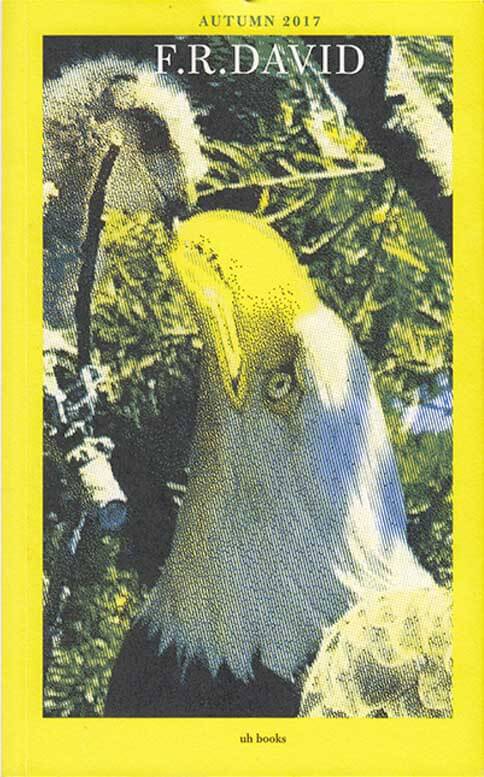
F.R. David - Recognition
“Recognition” is concerned with bodies, ecology, empathy, gazing at the world, and reading (environments) from non-anthropocentric POVs—nonetheless described and written by humans. Animals, birds, and trees feature heavily.
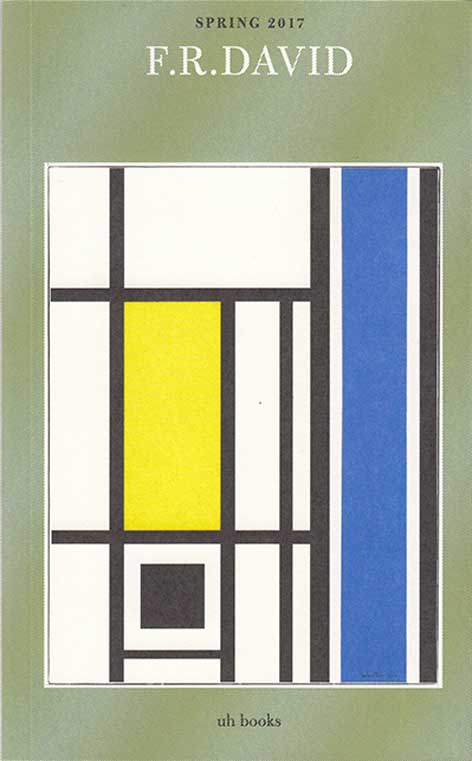
F.R. David - Inverted Commas
F.R.DAVID is a typographical journal, edited by Will Holder, dealing with the organisation of reading and writing in contemporary art practises. This 13th issue of F.R.DAVID is edited with Riet Wijnen, and has its origins in her Registry of Pseudonyms, an online database which accounts for who is who and why who is who. ‘Inverted Commas’ follows ‘pseudonym’ through names, naming, bodies, brains, self, author, other, reader, labour.